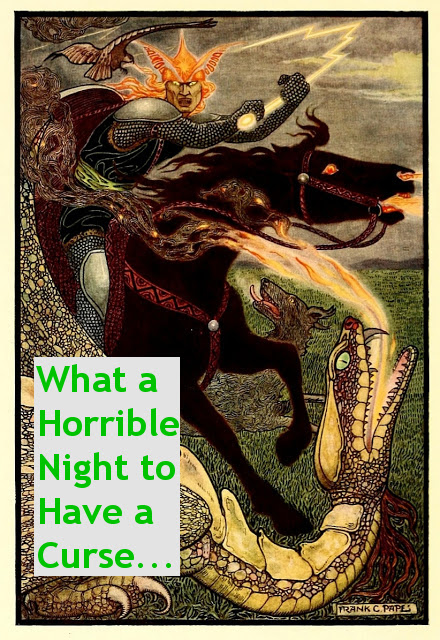I watched this YouTube video titled "5 Things in D&D that Make No Sense" [Of course referring to 5E specifically], and I found it interesting that she found these specific things to be annoying:
1. Falling damage in 5E caps at 20d6 (200' fall). She rightly points out that most mid-level 5E PCs will survive that.
Of course, they are also going to survive around six or seven sword stabs or axe slashes at that level, and be fully healed after a good night's rest. So I don't know why this particular break from real world physics bothers her so much. I do wonder if the 20 dice cap is related to the 20 dice cap for high level magic users in BECMI/RC D&D? It is a fairly arbitrary number to place the cap upon.
2. Shields. 5E treats all shields the same. Buckler or kite, round or tower, they all give a +2 bonus.
Growing up playing BECMI, this was just a given (although only a -1 bonus to AC), and the reasoning was addressed in the rulebook. Smaller, lighter shields are easier to maneuver into place to block an attack, while large shields provide more cover. Again, it's an artificial simplification that aids gameplay, even if that leads to a loss of realism.
And you could always go the AD&D route, where all shields give that -1 bonus, but only to specific attacks from specific directions, or a specific number of attacks in the round.
3. Religion in D&D. Pantheistic religions don't work the way they do in D&D, where everyone is devoted to a singular deity within the pantheon. Also, how can there be atheists in a word where the gods actually sometimes walk the Earth?
Again, starting playing with BECMI, and even in AD&D, this isn't really a thing. Maybe it started to develop in the 2E days, but it wasn't until 3E hit the shelves that I noticed this about how gods/religions work in D&D. And yes, it is odd, and shows the likely monotheistic cultural bias of the setting designers. But this isn't really something that's hard-coded into the rules, really. It's more of how things are presented, and how many players role-play the situations. So long answer short: don't like it, change it for your table.
4. The Find Traps spell. This is the one that really made me want to write a post about this video. Apparently, in 5E, this spell doesn't actually find the traps for you, it just lets you know that there are traps in the area that you can roll skill checks to locate.
OK, that is pretty lame.
But once more, coming from an older edition background (particularly editions where the find traps spell actually DOES find the traps for you), this is one of my big beefs with 5E magic. Everyone thinks that 5E magic is much more powerful than old school spellcasting classes because of at-will cantrips, more spells per day (at low levels anyway), and all the special abilities involved.
BUT... So many 5E spells are completely nerfed compared to how they worked in older editions. I can see why this spell in particular bugged the YouTuber, because it doesn't do what the name says it does, and it's fairly useless to cast this version of the spell.
So why is it named this? Continuity of spell names across editions of the game. As mentioned, the spell used to do exactly what the name promises. It's not a problem with the spell name, it's a problem with lazy game designers who think that they need to reword the spells in every edition to take away their usefulness, and in particular with 5E, to make everything into something that requires a d20 roll against some arbitrary difficulty number.
It's interesting to me that the YouTuber is mystified by this. And she probably doesn't even realize just how crappy so many 5E spells actually are. Anything that used to be an encounter winner spell in older editions has been depowered so that players won't get The Feels when NPCs or monsters use it against them. Or there are so many caveats on the use of the spell that interesting utility functions that creative players thought up over the years are now explicitly prohibited by the spell text. The only spells worth taking are just the boring "deal more damage" spells. Yawn.
5. Advantage and Disadvantage. Her problem is not with the mechanic itself (which is handy), but with how different situations that grant advantage and disadvantage always just cancel out to zero. You could be trying to make a ranged attack while prone, tied up, blind, in a wind storm, and cursed (all giving disadvantage), but your buddy using the Help action grants advantage, so all those negatives are cancelled. Roll normally.
Yeah, that is dumb. But if a DM really wanted to total up all the positive and negative factors in a situation, and make a rule that, say, 2 more advantage factors than disadvantage factors grants net advantage (and the reverse), who's stopping her? I don't think WotC can send Pinkertons to her door for that. Not yet, anyway.
It's not something I need to worry about anymore, so whatever on this last one.
_________________
Next week, I'm flying back to the U.S. with Flynn, so unless I get the itch to blog over the coming weekend, I probably won't have any content up here for a couple of weeks. As Arnold says, though, "Ahl be bahk."






#3 may derive from the sword & sorcery roots of D&D, where we see all sorts of petty gods with fervent followers: the snake god, the rat god, Issek of the Jug, etc.
ReplyDeleteAlthough I would question the premise of the statement that *everyone* is devoted to a single god. Clerics are, sure, but that was true in real life polytheistic cultures, too. If you were a Vestal Virgin you were committing your life to Vesta, but the average Roman prayed to whatever god they hoped to gain the blessings of in a specific circumstance. When I read, for example, the Forgotten Realms campaign setting books (at least the earlier ones), I imagine the same sort of scenario, with people offering prayers and sacrifices to various gods as relevant to their current activities and plans.
The idea that everyone should be devoted to a single deity is not my position, it's the YouTuber's position, and one I've seen many DMs express over the years. Not every DM does that, but enough have that I've noticed it as a trend. But as I said above, it's not something that I can find in the rules, nor was it something I noticed before the 3E era.
Delete#4 BECMI Berserker on YouTube has a great video on how old school spells are much more powerful and useful than the 5e versions. I recommend his channel.
ReplyDeleteI've seen some of his stuff, and generally agree with it. I'll track down that one. Thanks!
Delete